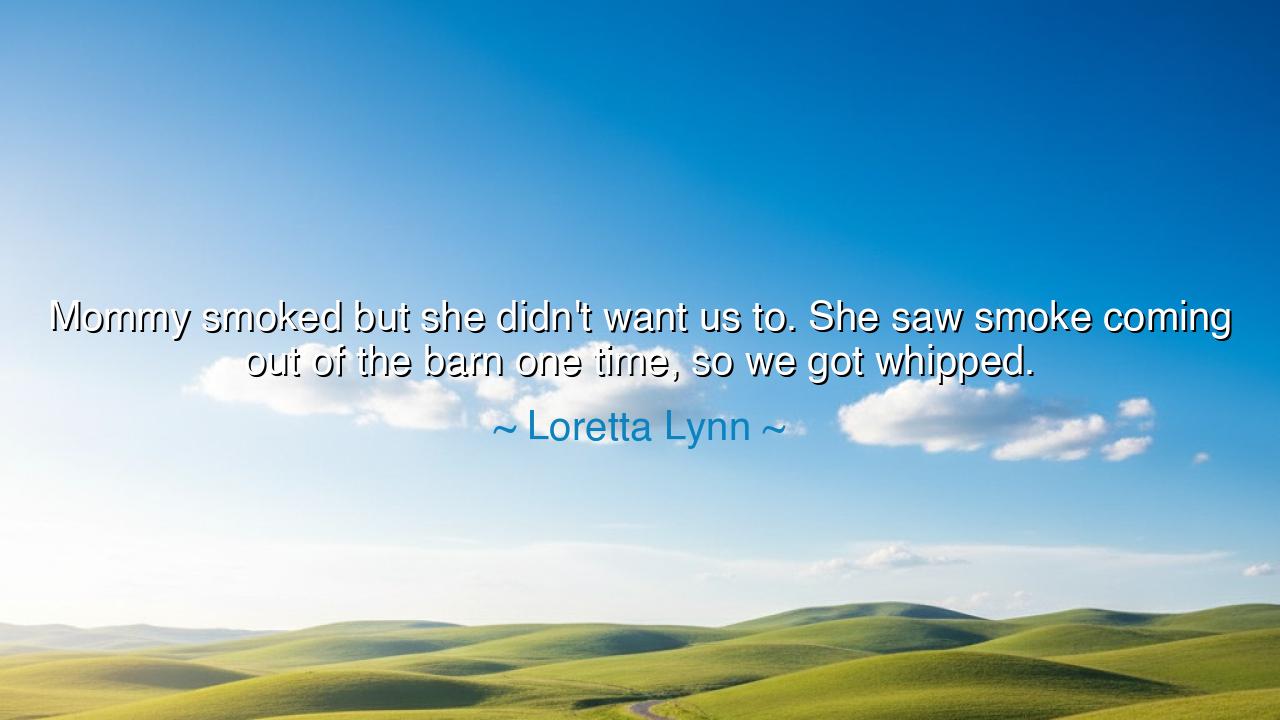
Mommy smoked but she didn't want us to. She saw smoke coming out
Mommy smoked but she didn't want us to. She saw smoke coming out of the barn one time, so we got whipped.






Hearken, O children of reflection, to the words of Loretta Lynn, whose memory of youth carries both humor and ancient wisdom: “Mommy smoked but she didn't want us to. She saw smoke coming out of the barn one time, so we got whipped.” In this tale lies the enduring truth of parental guidance: even those who falter or err themselves may seek to protect their children from harm, passing down lessons wrought from experience, fear, and love. The mother, though imperfect, acts as guardian, shaping behavior and morality through both example and discipline.
The ancients knew that wisdom often arrives wrapped in contradiction. A parent may err, yet from their mistakes springs insight that guides the next generation. In Loretta Lynn’s recollection, the mother’s own indulgence in smoking did not excuse the danger it posed when unchecked; her children, witnessing the potential for disaster—the smoke from the barn—were taught vigilance, obedience, and respect for the consequences of reckless action. Thus, parental authority is not merely about perfection, but about the courage to safeguard, instruct, and shape.
Consider the life of Benjamin Franklin, whose father smoked a pipe and yet cautioned young Benjamin about the hazards of fire and tobacco. Franklin’s wisdom, tempered by both curiosity and the gentle oversight of a parent aware of danger, allowed him to navigate life’s perils with care and foresight. Similarly, Loretta Lynn’s mother imparted lessons not only through words but through action: the sight of smoke, the fear of destruction, and the measured discipline that followed—each a teaching rooted in lived experience. Guidance, even when imperfect, carries profound weight.
Yet there is also a lesson in humility and acknowledgment of human imperfection. A mother may falter, may indulge, yet the essence of her care lies in the desire to protect her children from the very missteps she knows too well. Lynn’s anecdote reveals the paradox of life: wisdom and fallibility often coexist, and it is the heart’s intent, the mindful action in the face of danger, that imparts enduring lessons. Discipline, grounded in understanding, ensures that children carry forward the knowledge of risk, caution, and moral responsibility.
History offers many reflections of this duality. In ancient Sparta, mothers raised sons to be warriors, understanding both the danger and the necessity of hardship. Their own lives were often constrained by societal norms and personal limitations, yet through measured guidance—sometimes harsh, sometimes gentle—they cultivated resilience, courage, and foresight in their children. Loretta Lynn’s tale, though domestic and humorous, echoes this ancient pattern: the teaching of vigilance and responsibility arises from love, fear, and experience alike.
The eternal lesson is clear: children learn not only from the successes of their parents, but from the careful navigation of imperfection. Awareness, instruction, and discipline—tempered with love—prepare the young to understand consequence, danger, and responsibility. Lynn’s story reminds us that guidance is as much about protection as it is about moral instruction, and that even missteps can illuminate the path of wisdom for those who follow.
Practical guidance arises from this understanding: parents and guardians should act with mindfulness, teach through both example and experience, and acknowledge their own imperfections while ensuring the safety and moral growth of their children. Children, in turn, should observe, reflect, and carry forward these lessons, honoring the duality of care and fallibility. Protection and guidance, rooted in love and experience, are the hallmarks of enduring wisdom.
And so, let the teaching resound: parental guidance, even when imperfect, shapes destiny, instills vigilance, and teaches responsibility. From the smoke of a barn, from the small missteps and the lessons imparted, children learn the sacred dance of caution, discernment, and care. In this dance, the imperfect actions of the parent become the enduring wisdom of the child, echoing through generations with power, humility, and love.
If you wish, I can also craft a lyrical, audio-focused version of this piece, with rising and falling cadence, dramatic pauses, and evocative phrasing to make it captivating when narrated aloud. Do you want me to do that next?






AAdministratorAdministrator
Welcome, honored guests. Please leave a comment, we will respond soon